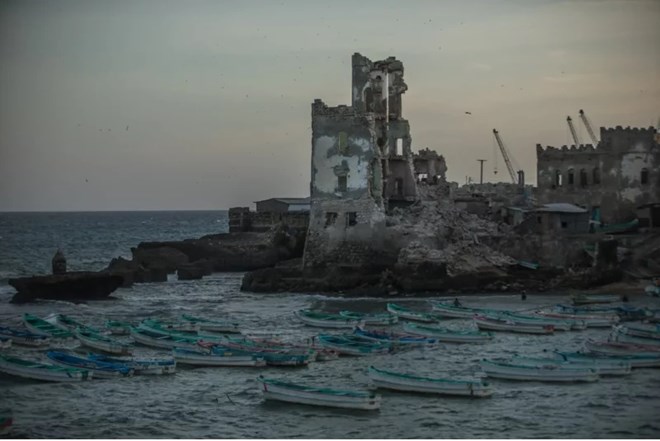Tuesday August 27, 2024
By Afyare A. Elmi, Yusuf Hassan
A harbor in Mogadishu, Somalia.Credit / Brian Otieno for The New York Times
Trouble has horns to hold but not tails. This Somali proverb, suggesting that disaster can be prevented but not easily controlled, feels very apt for East Africa right now. Trouble has certainly arrived. Thanks to Prime Minister Abiy Ahmed of Ethiopia’s expansionist ambitions and reckless designs, the Horn of Africa is on the cusp of a war that would imperil the region and rebound against the rest of the world. It must be stopped before it’s too late.
The catalyst for the conflict is Mr. Abiy’s obsession with making Ethiopia a coastal state. Last year, he declared that Ethiopia could not stay landlocked and must have access to the sea, either by negotiation or by force. Somalia, the weakest of the five coastal countries that border Ethiopia, was the obvious target. On Jan. 1, Mr. Abiy duly signed a memorandum of understanding with the president of Somaliland, a self-declared breakaway republic in northwestern Somalia. In exchange for officially recognizing Somaliland, Ethiopia would gain a 12-mile naval base on the Gulf of Aden. Mr. Abiy would have his coast.
This was a clear violation of Somalia’s sovereignty and territorial integrity, recalling Ethiopia’s destructive history of meddling in the country. Somalia immediately rejected the memorandum and mounted a diplomatic offensive, explaining to regional states and international powers that Ethiopia was seeking control of Somali territory through illegal means. The United Nations, the African Union, the United States and the European Union all backed Somalia’s position, emphasizing the necessity of respecting established boundaries and national sovereignty.
Tensions, bubbling away all year, have escalated in recent weeks. In a display of power, Ethiopia sent its troops to Somalia twice in June, setting off complaints from Somalia to the United Nations Security Council. In July, a local militia in Somalia looted two truckloads of weapons and ammunition sent from Ethiopia, suggesting that arms have made their way into the country, too.
Somalia, for its part, threatened to expel Ethiopian troops from the African peacekeeping forces in the country and, in a bold move, opened a defense pact with Egypt in July — adding to one it signed earlier in the year with Turkey. Ankara has stepped in to mediate but has been unable to find a solution. With both sides at loggerheads, the region is sitting on a time bomb.
War would be devastating. Involving rival and well-armed nations, ethnic communities, religious groups and international backers, conflict would bring bloodshed and disaster to both countries. Somalia, slowly recovering from a devastating three-decade civil war, would scarcely be able to bear it. Ethiopia is already mired in multiple conflicts within its borders — in its Tigray, Amhara and Oromia regions — and is facing conflict on its Eritrean and Sudanese borders. Another front, stretching thousands of miles, could bring the country to collapse.
The region, already racked by the war in Sudan, would become even more unstable. Conflict could draw in Red Sea states such as Saudi Arabia, Egypt, Yemen, Sudan, Djibouti and Eritrea, all of which consider the body of water essential for their national security. The United States, China and some European nations already have a military presence in the Red Sea; countries like Turkey, Iran, the United Arab Emirates and Russia have lately entered the fray. The region could quickly become a dangerous battlefield for global and regional powers.
For all its precariousness, East Africa is vital for international commerce and security. The Gulf of Aden and the Red Sea connect Asia to Europe and the Americas, while the Horn serves as Asia’s gateway to the whole African continent. By disrupting key maritime routes, war in the area would endanger global trade. Equally worrying, it would also revive Islamic extremist groups such as Al-Shabaab, which has already claimed to have recruited thousands of young Somalis to fight the Ethiopians. An unstable East Africa poses a risk to the entire world.
Time is short: Another effort at mediation failed this month. To prevent the region from tipping into catastrophic conflict, the world — and in particular the United States — must communicate to Mr. Abiy that his expansionist ambitions won’t be tolerated. Ethiopia, like any other landlocked state, should seek commercial access to the sea through cooperation and economic integration, not deals with secessionists. Washington, which has vested greatly in the region, must also exert pressure on the leaders of East African countries to promote dialogue, as well as try to reconcile Somalia and Somaliland.
It won’t be easy. But the Red Sea and the Gulf of Aden are too important to become a theater of war, and East Africa is too fragile for reckless adventures. Mr. Abiy should be told to trouble by the horns. Because once it takes off, there will be no tail to restrain it.
Dr. Elmi is a professor at the City University of Mogadishu, where Mr. Hassan is a fellow. They wrote from Mogadishu, Somalia. This Op-Ed originally appeared in the New York Times